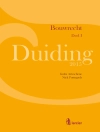Shines a light on the ways in which civil procedure may privilege—or silence—voices in our justice system
In today’s increasingly hostile political and cultural climate, law schools throughout the country are urgently seeking effective tools to address embedded inequality in the United States legal system. A Guide to Civil Procedure aims to serve as one such tool by centering questions of systemic injustice in the teaching, learning, and practice of civil procedure.
Featuring an outstanding group of diverse scholars, the contributors illustrate how law school curriculums often ignore issues such as race, gender, disability, class, immigration status, and sexual orientation. Too often, students view the #Me Too movement, Black Lives Matter, immigration/citizenship controversy, or LGBTQ+ issues as mere footnotes to their legal education, often leading to the marginalization of many students and the production of graduates that do not view issues of systemic injustice as central to their profession.
A Guide to Civil Procedure reveals how procedure is, and always has been, a central pressure point in the struggle to eradicate structural inequality and oppression through the courts. This book will give students and scholars alike a more complex view of their roles as attorneys, sharpen their litigation skills, and provide a stronger sense of community and purpose in the law school classroom.
A propos de l’auteur
Elizabeth Porter is the Associate Dean for Academic Administration and Charles I. Stone Professor of Law at the University of Washington School of Law.












